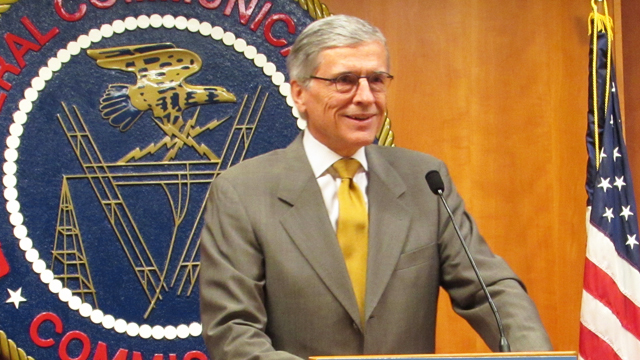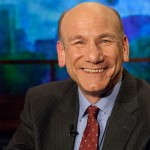This post first appeared at the Jewish Journal.

Tom Wheeler FCC Chair (Photo: FCC Flickr/US Government works)
The last best hope to stop Big Money’s rout of American democracy is a former trade group lobbyist who’s reluctant to stretch his spandex superhero suit too thin.
Plutocrats have been on a roll for a while in the US, and campaign finance reform is in full retreat. Though Americans hate money’s “obscene” role in politics, according to a new New York Times/CBS poll, they feel hopeless about changing it. Thanks to the Supreme Court’s Buckley and Citizens United decisions, money is speech and corporations are people, so forget about limiting what billionaires and Super PACs can contribute to campaigns.
“The few rules that are left, people feel free to ignore,” says a Democratic commissioner on the Federal Election Commission, which is “perpetually locked in 3-to-3 ties along party lines.” Its chair, Ann M. Ravel, admits that the “likelihood of the laws being enforced is slim…. People think the FEC is dysfunctional. It’s worse than dysfunctional.”
But for the media-industrial complex, it’s happy days. “The 2016 presidential election is right around the corner,” said CBS president Les Moonves in a February investor call, “and thank God the rancor has already begun.” Campaign spending will exceed $5 billion – a windfall that goes straight to TV station owners – and that’s just for the presidential race. Soon, ads that will make you want to take a shower will be pumping political sewage 24/7. Don’t look to TV news to fact-check them; with few exceptions, political advertising will likely swamp political news as it did in Philadelphia last year, by 45 to one.
Worse, those ads will be funded anonymously. Many of the slimiest and most deceptive will end with something like this: Paid for by Americans for an American America. We will have no clue what these anodynely named front groups really are or whose dark money is behind them, because the law doesn’t require transparency or accountability. We’ll get good and mad at the dog crap soiling democracy’s lawn, but we won’t even know whom to shame.
What are we doing to prevent the anti-democratic horror show now unfolding? In the Citizens United opinions, eight Supreme Court Justices said new donor disclosure laws would not only be constitutional – they’d be good for us: “transparency enables the electorate to make informed decisions and give proper weight to different speakers and messages.” Yet Congress isn’t remotely interested in legislating disclosure. And as that Times/CBS poll found, a majority of Americans of both parties know that elected officials are unwilling “to fight the system they inhabit or to change the rules they have already mastered.”
But the Federal Communication Commission already possesses the power to rescue us from dark money. On Wednesday morning, says Michael J. Copps, who was a commissioner for 10 years, FCC chairman Tom Wheeler could say, “We have had on the books since the original Telecommunications Act of 1934 a requirement that the sponsors of ads, including political ads, must be identified, and we’re going to start enforcing it. We don’t have to wait for the president to send a disclosure bill to Congress that won’t go anywhere; we don’t have to wait for Congress to bite the hand that feeds it. The FCC can do that rule making on its own, and after a 120-day public comment period, if you conceal who’s paying for those ads, you’ll get nailed.” Enforcing that provision is “at the top of my bucket list,” Copps says, “and I’m looking for company, Tom.”
When President Obama appointed Wheeler in 2013, my heart sank. I wanted a trustbuster and consumer advocate in that job; instead, we got the former head of the Grocery Manufacturers of America and of the National Cable & Telecommunications Association. I’m so glad I was so wrong about him. In less than two years at the FCC, he’s made bold moves, and scored some important victories, on five key fronts.
Competition: Wheeler’s disappointing predecessor, Obama-appointee Julius Genachowski, submitted to Comcast’s takeover of NBC-Universal. But Comcast abandoned its subsequent bid to acquire Time Warner Cable when regulators at Wheeler’s FCC and at the Department of Justice were poised to block Comcast from becoming the de facto national cable monopolist.
Open Internet: Genachowski also set up net neutrality to fail, paving the way for Internet providers to extract pay-to-play fast-lane tolls from big tech and content companies, leaving everyone else to suffer slowmo buffering. But Wheeler, bucking fierce industry and partisan opposition, and buoyed by four million public comments triggered in part by a brilliant segment on Last Week Tonight With John Oliver that crashed the FCC’s servers, led the commission to classify the Internet as a public utility. No wonder Wheeler’s successor at the cable lobby, Michael Powell, who was also George W. Bush’s appointee as FCC chair, is now suing to overturn the decision.
Privacy: In April, Wheeler kicked off an FCC workshop on consumer broadband privacy with the clarion statement that “privacy is unassailable.” A few weeks later, the commission put Internet Service Providers on notice that the F.C.C. will “no longer be napping at the wheel” when it comes to practices like Verizon’s creation of undeletable zombie cookies and AT&T’s “charging its gigabit fiber users a $44-$66 fee if they want to opt out of having their traffic snooped on via deep packet inspection.”
Digital divide: In May, Wheeler proposed that the Reagan-era Lifeline program, which subsidizes the telephone service of 12 million low-income households, be extended to broadband access. Within days, Republicans pushed back against the plan. Wheeler’s FCC has also pre-empted industry-backed state laws that prevented underserved communities like Wilson, North Carolina and Chattanooga, Tennessee from expanding municipal broadband networks.
Robocalls: On June 18, the FCC will vote on Wheeler’s plan to crack down on telemarketers and scammers who – despite the Do Not Call Registry – have invaded consumers’ landline and wireless devices with robocalls and spam texts.
So ex-lobbyist Tom Wheeler’s courage to battle deep-pocketed corporations on those five fronts transformed him in my mind from oligarch apologist to American Avenger. That’s why I’m so bummed he won’t use his superpowers to fight the super PACs.
“Maybe you have noticed,” he said a couple of weeks ago, when asked if the FCC will use the authority it already has to require disclosure of the secret sponsors of political ads, “we have a long list of telecommunications-related decisions that we are dealing with right now, and that will be our focus.” He punted to the Hill: “Well, if the Congress acts, then we will clearly follow the mandate of Congress.” But as he had to know, just two days before he said that the House Communications and Technology subcommittee, on a party-line vote, shot down a law that would have forced dark money into the light.
Five out of six ain’t bad. But net neutrality, privacy and the other issues on Wheeler’s plate, important as they are, won’t rescue democracy from the rot of corruption. Maybe another outpouring of public outrage can get him to reach for the spandex one mo’ time. Paging John Oliver?
The views expressed in this post are the author’s alone, and presented here to offer a variety of perspectives to our readers.


